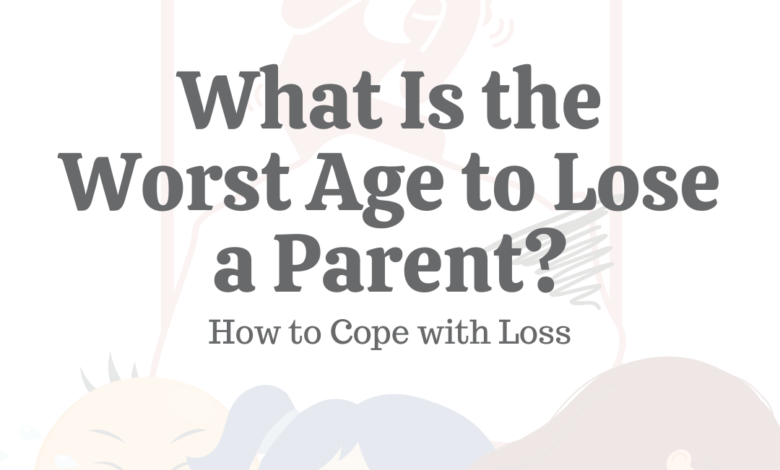Look out for worst age to lose a parent

Losing worst age to lose a parent a parent is undoubtedly one of life’s most challenging experiences. It shakes us to our core, leaving behind an indelible mark on our hearts and minds. But have you ever wondered at what age this heart-wrenching loss becomes even more devastating? In today’s blog post, we will delve into the depths of this topic and explore the worst age to lose a parent. From understanding the emotional and psychological effects on children to discussing coping strategies and grief counseling, we aim to shed light on this sensitive subject with empathy and compassion. So grab a cup of tea or coffee, settle in, and let’s embark on this journey together as we explore how best to support children through their darkest moments.
The Impact of Losing a Parent
Losing a parent has a profound impact on every aspect of a person’s life. It is an experience that can shape their future relationships, career choices, and overall sense of self. The emotional upheaval that accompanies such a loss cannot be underestimated.
For children, the impact can be particularly devastating. Their world is turned upside down as they grapple with feelings of abandonment, confusion, and overwhelming grief. They may struggle to understand why this tragedy has occurred and blame themselves for their parent’s absence.
The psychological effects are far-reaching as well. Children who lose a parent at a young age may develop issues with attachment and trust in future relationships. They may also experience heightened anxiety or depression as they navigate through life without the guidance and support of both parents.
Furthermore, the loss of a parent can disrupt a child’s sense of stability and security. Suddenly faced with new responsibilities or changes in living arrangements, they may feel lost and uncertain about their place in the world.
It is important to acknowledge that everyone copes differently with such traumatic experiences; there is no one-size-fits-all approach to dealing with parental loss. However, understanding the immense impact it can have on individuals allows us to extend empathy and support during these difficult times.
At What Age is It Most Difficult?
At What Age is It Most Difficult?
Losing a parent at any age is undeniably devastating, but there are certain stages of life where the impact can be particularly challenging. While each individual’s experience differs, research suggests that losing a parent in adolescence or early adulthood can have long-lasting emotional and psychological effects.
During adolescence, young people are already navigating the tumultuous waters of identity formation and independence. The loss of a parent during this critical stage can disrupt their sense of self and leave them feeling adrift in an uncertain world. They may struggle with feelings of abandonment or guilt for not being able to prevent their parent’s death.
Similarly, losing a parent in early adulthood can be incredibly difficult. This stage is often marked by significant life transitions such as starting college, entering the workforce, or establishing one’s own family. The sudden absence of a guiding figure can make these milestones feel bittersweet and overwhelming.
It’s important to recognize that everyone copes with grief differently, regardless of age. However, children who lose a parent at these vulnerable stages may benefit from additional support networks and resources. Friends, family members, therapists, or support groups can offer guidance and understanding during this challenging time.
Losing a parent at any age is difficult; however, research suggests that adolescence and early adulthood pose unique challenges due to ongoing development processes and major life transitions taking place during these periods
Emotional and Psychological Effects on Children
Emotional and Psychological Effects on Children
Losing a parent at any age can have profound emotional and psychological effects on children. However, the impact of this loss tends to be especially challenging during specific developmental stages.
For young children, the sudden absence of a parent can lead to feelings of confusion, fear, and insecurity. They may struggle with understanding death and may exhibit regressive behavior such as bed-wetting or clinging onto caregivers for support. These little ones often find it difficult to express their emotions verbally, which can further complicate their healing process.
Older children who lose a parent also face unique challenges. Adolescence is already a time filled with hormonal changes and identity exploration; adding grief into the mix intensifies these struggles exponentially. The loss may trigger feelings of anger, resentment, or guilt as they navigate through complex emotions while trying to establish themselves as individuals.
The psychological effects vary from child to child but commonly include symptoms such as depression, anxiety disorders, lowered self-esteem, difficulty concentrating in school or social settings.
It’s crucial for caregivers and loved ones to provide consistent support during this tumultuous time. Encouraging open communication about feelings without judgment gives children an outlet for expression. Additionally, seeking professional help through therapy or grief counseling can offer additional coping strategies tailored specifically for each child’s needs.
Remember that every child copes differently – some may require more time alone while others seek comfort in spending time with friends or engaging in creative outlets like art therapy.
Supporting these young individuals through their grief journey is vital not only for their immediate well-being but also for their long-term emotional growth and resilience.
Coping Strategies for Children Who Lose a Parent
Coping Strategies for Children Who Lose a Parent
When children lose a parent, it can feel like their world has been turned upside down. The grief and sadness they experience can be overwhelming, but there are coping strategies that can help them navigate this difficult time.
It’s important to encourage open communication. Children need to know that it’s okay to express their feelings of anger, sadness, or confusion. Creating a safe space for them to share their emotions is crucial in helping them process their loss.
Another helpful strategy is maintaining routines and stability. Consistency provides comfort during times of uncertainty and helps children feel secure amidst the changes happening around them. It may be necessary to make adjustments depending on the situation, but keeping some aspects of daily life consistent can provide much-needed stability.
Support from friends and family members is also vital. Encouraging children to lean on loved ones who offer understanding and empathy can make a significant difference in their healing process. Having strong support networks allows children to feel less alone in their grief journey.
Engaging in activities that promote self-expression and emotional release can be therapeutic for grieving children as well. Art therapy, journaling, or participating in sports or hobbies they enjoy are all outlets for processing emotions and reducing stress.
Seeking professional help through grief counseling should not be overlooked. Trained therapists specialize in supporting bereaved individuals by offering guidance on navigating complex emotions associated with loss.
In conclusion…
The journey of grieving for a child who has lost a parent is undoubtedly challenging. However, implementing coping strategies such as open communication, maintaining routines, seeking support from loved ones,
engaging in self-expression activities, and considering professional help through grief counseling can assist these young individuals as they navigate this difficult road towards healing.
Importance of Grief Counseling
Grief counseling plays a crucial role in helping children who have lost a parent navigate through their emotions and build resilience. It provides them with a safe space to express their feelings, fears, and doubts without judgment.
During grief counseling sessions, trained professionals create an environment where children can explore their grief in healthy ways. They offer guidance on how to cope with the emotional rollercoaster that comes with loss and help them develop effective coping strategies.
One of the key benefits of grief counseling is that it helps children understand that they are not alone in their experience. They get to interact with others who have faced similar losses, which can provide comfort and reassurance.
Additionally, grief counseling equips children with tools to manage overwhelming emotions such as sadness, anger, guilt, or confusion. By teaching them healthy ways to process these emotions, counselors empower children to find healing and move forward at their own pace.
Moreover, grief counseling also focuses on addressing any unresolved issues or unfinished business related to the deceased parent. This might involve exploring feelings of guilt or regret and working towards forgiveness or closure.
By seeking professional help through grief counseling services specifically designed for children who have lost parents, families can ensure that their child receives the support they need during this challenging time. It allows the child’s journey towards healing and recovery to be guided by experienced professionals who specialize in childhood bereavement.
Remembering that each child’s grieving process is unique is vital when considering the importance of grief counseling for those who have lost a parent at any age; it offers invaluable support tailored specifically for young individuals navigating this difficult terrain.
Dealing with Guilt and Regret
Dealing with Guilt and Regret
The journey of grief is often accompanied by a rollercoaster of emotions, and guilt and regret are no exception. When a parent passes away, children may find themselves burdened with feelings of guilt or regret that can be overwhelming and confusing.
Guilt can stem from various sources – perhaps the child feels guilty for not spending enough time with their parent or for any unresolved conflicts they had. It’s important to remember that these feelings are normal, but they shouldn’t consume us.
Regret is another emotion that can weigh heavily on children who have lost a parent. They may regret things left unsaid or undone, wishing they had expressed their love more openly or spent more quality time together. It’s crucial to acknowledge these regrets while also recognizing that we cannot change the past.
One way to cope with guilt and regret is through self-compassion. Remind yourself that you did your best in the circumstances you were facing at the time. Practice forgiveness towards yourself as well as towards your late parent if necessary.
Sharing your feelings with others who have experienced loss can also provide comfort and validation. Find support groups or counseling services where you can express yourself without judgment. Remember, it’s okay to ask for help when needed.
Honor your parent’s memory by living a life aligned with their values and aspirations for you. Make choices that would make them proud and celebrate their legacy in meaningful ways.
Remember, everyone’s grief journey is unique, so give yourself permission to feel all the emotions associated with losing a parent – including guilt and regret – while also taking steps toward healing and self-acceptance.
Conclusion: Supporting Children Through Loss
Supporting children through the loss of a parent is crucial for their emotional well-being and long-term development. It is important to acknowledge that there is no “worst” age to lose a parent, as each child’s experience will be unique. However, it is evident that losing a parent at any age can have profound effects on a child’s life.
Emotional and psychological impacts may vary depending on the child’s age and understanding of death. Younger children may struggle with feelings of confusion, fear, or abandonment. Adolescents, on the other hand, might grapple with anger, guilt, or identity issues.
To help children cope with their grief and navigate these challenging emotions, several strategies can be implemented. Establishing open lines of communication allows them to express their feelings freely without judgment or criticism. Encouraging healthy outlets such as art therapy or support groups can also provide comfort and solace.
Grief counseling plays an essential role in supporting children through loss. Professional counselors are trained to guide individuals through the grieving worst age to lose a parent process by providing tools and techniques for healing and resilience-building. These sessions offer a safe space where children can explore their emotions while receiving guidance from someone experienced in dealing with loss.
Dealing with guilt and regret is another aspect that worst age to lose a parent should not be overlooked when supporting grieving children. Many kids feel guilty about worst age to lose a parent things they said or did not say before their parents passed away – this burden weighs heavily on them even if it was outside of their control. Assuring them that they are not responsible for what happened enables them to let go of these feelings over time.
In conclusion: Losing a parent at any age brings immense pain and challenges for a child; however, there isn’t necessarily an ideal or worst age for this experience. What matters most is how we support our children during such difficult times by acknowledging their emotions, providing resources like grief counseling when needed, encouraging healthy coping mechanisms like communication and artistic expression while addressing guilt and regret. By offering a safe and nurturing environment, we can help children navigate




